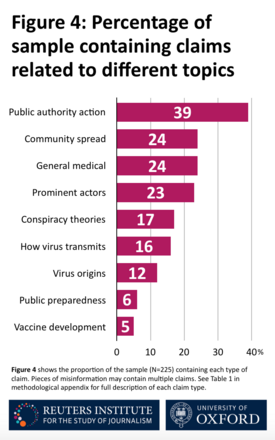
Experts from the Reuters Institute analysed a sample of 225 pieces of fact-checked misinformation published between January and March 2020.
They found a massive growth in fact-checks about COVID-19. Little coronavirus disinformation is completely fabricated, most is "reconfigured" misinformation.
All disinformation is technologically simple (“cheap fakes”), not employing deep fakes or other AI-based tools.
While only 20% of misinformation is produced or spread by public figures, they have the most engagement on social media (69%). Still, some bottom-up individual pieces were occasionally able to generate large volumes of engagement.
Much misinformation concerns the actions of public authorities (39%).
Social media platforms have responded to much, but not all misinformation identified by fact-checkers, and the percentages of false posts that still have no warning label differs across platforms: 59% on Twitter, 27% on YouTube, and 24% on Facebook.
Tags: Fake news and disinformation Social media Fact-checking COVID-19The content of this article can be used according to the terms of Creative Commons: Attribution-NonCommercial 4.0 International (CC BY-NC 4.0) . To do so use the the wording "this article was originally published on the Resource Centre on Media Freedom in Europe" including a direct active link to the original article page.

